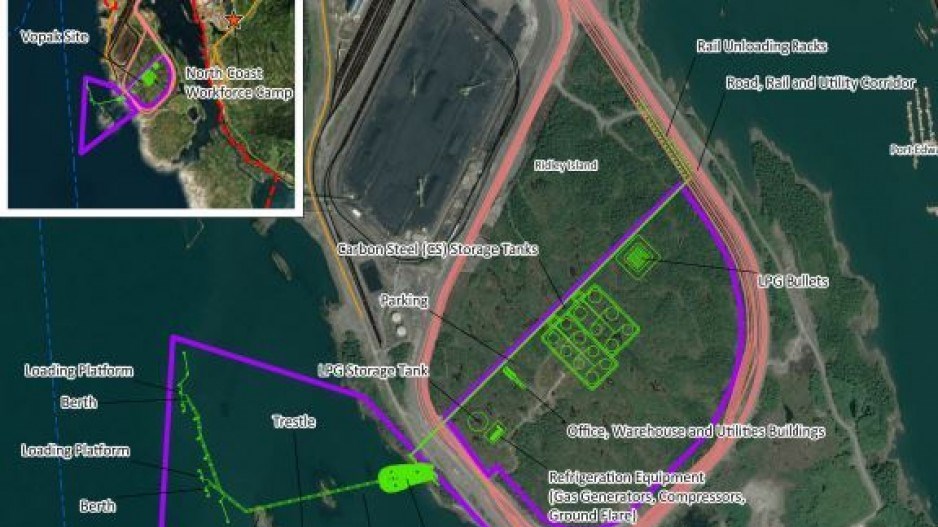A public consultation period for a proposed new bulk fuels export terminal on Ridley Island in Prince Rupert has wrapped up with the T. Buck Suzuki Environmental Foundation calling the risk assessment of the potential impact of a fuel spill on marine life inadequate.
The proposed new bulk fuel export terminal would be built by Vopak Development Canada – the Canadian subsidiary of the Dutch company Royal Vopak – at an estimated capital cost of $885 million, according to documents filed as part of the public consultation period in a BC Environmental Assessment Office (EAO) review process.
The project is being assessed under a harmonized review process by the BC EAO and Environment and Climate Change Canada under the new Impact Assessment Act.
Vopak proposes to build a new bulk fuels storage and export terminal on Ridley Island. The new terminal would store liquid petroleum gas (LPG), diesel and-or gasoline, and methanol, which would be transported by rail to the terminal. A jetty would be built for the loading of fuel carriers.
At full capacity, the terminal would have up to 240 trains bringing fuels in, and approximately 171 vessels per year to export it, including:
- 25 large LPG carriers;
- 116 medium sized methanol tankers; and
- 30 Panamax tankers for light diesel and gasoline
Volpak says the project would employ 250 construction workers, with “non-local” workers to be housed at two existing work camps near Port Edward.
The company said it expects to begin construction in the fourth quarter of this year. It estimates the project will take two years to complete. The company estimates the terminal would spend $29 million would be spent annually in B.C.
As part of the EAO review process, a public consultation was held from July 22 to August 21.
As part of the public consultation, the T. Buck Suzuki Foundation has found risk assessments for potential spills of petroleum products and impact on marine life to be wanting. In particular, the organization raises concerns about the potential impacts of a fuel spill on Flora Banks.
Flora Banks is critical salmon rearing habitat. Potential impacts on Flora Banks was one of the biggest obstacles to the now-defunct Pacific Northwest LNG project.
The EAO has acknowledged that a fuel spill could have “significant adverse environmental and human effects," but has deemed the risk of a spill to be low.
In its submission at the end of the public consultation process, the T. Buck Suzuki Foundation said that the risk assessment has not been adequate.
“It appears that large portions of, or perhaps even all of, the risk of impacts to salmon at Flora Bank was not addressed and that the application only created the appearance of addressing it as a result of lack of transparency regarding the omission of impacts on Flora Bank as well as the omission of several important accident scenarios,” the environmental organization states in the public review documents.




